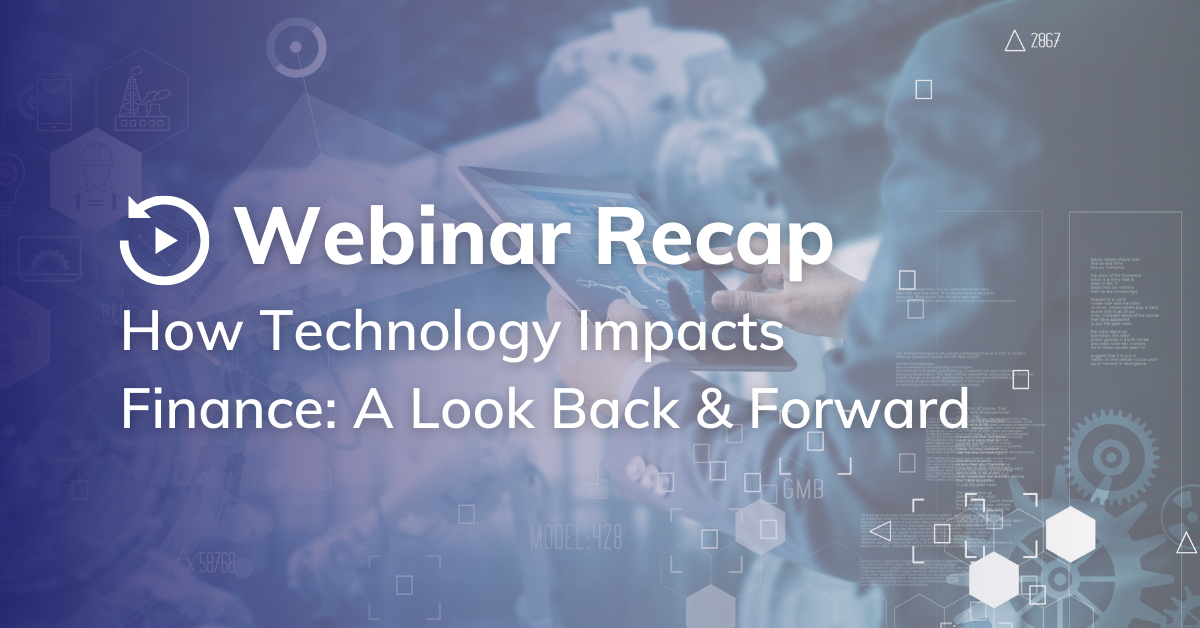Blog | AI In Finance
Webinar Recap: How Technology Impacts Finance: A Look Back and Forward

What have been the most significant challenges and changes of this past year?
There's no better time to step back, take stock and reflect on the past year than a couple of weeks before ringing in a new one.
Elaine Nowak, Director Product Marketing here at Auditoria, had the pleasure of speaking with Tyler Sloat, CFO of Freshworks, as he shared his insights and perspectives on the unprecedented and challenging times we continued to face throughout 2021, during a recent Auditoria-hosted webinar.
Didn’t have a chance to catch the webinar live? Don’t worry, we’ve got you covered. Here are three key takeaways from the discussion about significant shifts organizations had to make for their businesses to survive.
1. CFOs are now “Business Model Architects.”
During the webinar, Tyler explained how he saw firsthand why the role of a CFO has evolved to become a “business model architect.” Pressure to adapt quicker and smarter by design is a common occurrence business leaders are faced with today. The CFO’s job now performs two essential roles, combined to place responsibility on achieving goals while also facilitating growth.
One role serves to design improved business models, while another role serves to maintain the integrity of data in the processes. The responsibility of data falling under the CFO rather than IT or Operation is now pretty common practice. The use of automation to replace existing systems needs to be governed by internal controls. Checks and balances need to be gradually introduced and tested throughout the development of new processes.
This aids in seamlessly moving to a more efficient business model. For other CFOs, Tyler encourages them to put an emphasis on internal controls to test and see if it’s working as it should. Look for indicators that may cause risk before implementing a new system to decrease the likelihood to produce errors. Timeliness and accuracy of data are important to make quick decisions and remove additional worry. As we move forward in utilizing digital automation, we continue to depend on the insights they produce even more.
2. Automation is poised to make waves in the back office.
As more businesses begin to go digital, there’s no surprise that their reliance on technology increases.
However, in our 2021 State of Automation Survey, we found that nearly 60 percent of financial professionals said that current back-office systems are not sufficiently automated. During the webinar, Tyler commented that perhaps those numbers are sadly even higher.
AI and machine learning are poised to disrupt the back office. By adding automation to work processes, employees are no longer required to perform repetitive tasks. Technological advances have made it easier for them to focus on work products as a value-add by performing their job function at a higher level.
3. The ripple effects of the pandemic will be felt for years to come.
Another significant change that affected businesses was the overnight shift requiring people to work from home, followed by a mix of employees working either at the office, remotely, or in a hybrid environment. As a result, companies quickly learned they need to adjust the expectations placed on employees during uncertain and challenging times.
Many people are overwhelmed and burn out quickly if this adjustment doesn't happen. Businesses should be more flexible and accommodating for different employee needs and capabilities to adapt accordingly.
On top of that is the challenge to keep employees connected and engaged.
Since the pandemic, people started rethinking what they want from work and shifting their priorities accordingly. The workforce is likely to offer more freedom as we become more disparate. But at the same time, when limitations of location are removed, it presents an opportunity for expanded talent pools. Gone are the days when employees were limited to the four walls of their cube.
Unfortunately, there was little predictability during 2021. Now more than ever, businesses need to have a contingency plan with flexibility in mind to act quickly when impacted by unanticipated events. Companies should look to the future by being more proactive in making decisions rather than reactive. Foresight is crucial to sustaining a business.
Organizations should be ready to pivot and take advantage of unexpected options that come their way. Companies that have an open outlook also have the power to work more efficiently and with greater visibility.
Want to hear more from Tyler and Elaine’s conversation? Click here to watch the webinar in full.
And if you’re ready to embrace the power of automation, schedule a demo to see our Auditoria SmartBots in action to help move the back office forward.
